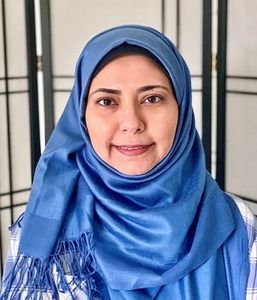GTU Communications
Faculty Publication Spotlight | Dr. Mahjabeen Dhala
Dr. Mahjabeen Dhala is Associate Professor of Islamic Studies, Director of the Madrasa-Midrasha Program, and Chair of the Women’s Studies in Religion Program at the Graduate Theological Union. Dr. Dhala’s work focusses on the contributions and challenges of pre-modern Muslim women viz-a-viz Islamic understandings of faith, philosophy, and justice. Her interdisciplinary research features an integration of Islamic theological texts with feminist theories. She has also demonstrated a commitment to advancing interreligious and intersectional dialogue through her research, teaching, and mentoring, and through her global travels, presenting on topics such as Muslim diversity and leadership, religious and cultural understanding, women’s empowerment, and social justice.
GTU: Congratulations on your recent publication, Feminist Theology and Social Justice in Islam: A Study on the Sermon of Fatima! Can you give us an overview of your book and what inspired you to delve into this particular topic?
Mahjabeen Dhala (MD): My book delves into the often overlooked and underrepresented figure of Fatima, the daughter of Prophet Muhammad, within Western academic discourse. While Fatima holds a central position in mainstream Islamic history and is a key figure in Shia theology and identity, her life remains largely understudied. I focus on a historical textual analysis of her renowned sermon, the Khutbat Fadakiyya (Sermon of Fatima), to unpack three major themes: women's theology, leadership, and social justice. Through a nuanced analysis of Fatima's words and their implications, I seek to deepen our understanding of her significance and her contributions to Islamic thought and practice.
What inspired me to delve into this sermon was the recognition of the glaring gap in Western academic discourses regarding Fatima and her legacy. The sermon, delivered just ten days after the death of the Prophet Muhammad, addresses the confiscation of Fatima's lands by the government and serves as a critical and contentious episode in Islamic history. Despite her importance within Islamic tradition, her story and teachings have been largely sidelined in scholarly discussions. By focusing on her sermon and its themes, my aim was to rectify this oversight and bring her voice and perspective to the forefront of academic inquiry.
GTU: Your book has been hailed as a landmark study by scholars like Asad Q. Ahmed. How did you combine historical sources and theoretical frameworks to uncover Fatima's role as a powerful agent of social justice and moral reckoning?
MD: In my research, I adopted a dual methodology that intricately weaves together my extensive training in traditional Islamic scholarship with my academic expertise in feminist studies and critical theory. This enabled me to engage with historical Islamic texts and interpretive traditions through a contemporary lens, thereby unveiling nuanced insights into the role and significance of figures like Fatima. Firstly, I accessed and analyzed primary Islamic sources—such as hadiths, tafsirs, and historical narratives—in their original languages. By situating these texts within the broader socio-political and theological discourse of their time, I could ascertain the traditional views of her role. Simultaneously, I employed contemporary theoretical frameworks—particularly from feminist theory, critical race theory, and theories of justice and ethics—to re-evaluate these interpretations.
This approach was pivotal in challenging the existing narratives that often marginalized or simplified Fatima’s contributions. Through this lens, I explored themes of power, agency, and resistance in her actions and speeches, highlighting how she could be viewed not only as a religious figure but also as a proactive agent of social justice and moral reckoning.
Moreover, I integrated insights from modern gender studies to critique and expand upon traditional views that may have underrepresented her leadership and theological contributions. This critical engagement fostered a more inclusive re-interpretation that recognizes Fatima as a theologian and a social justice activist, rather than merely a peripheral figure in Islamic history.
By synthesizing these diverse methodologies, I was able to construct a more holistic and empowered portrayal of Fatima, reflecting both her historical impact and her contemporary relevance as a symbol of resilience and ethical leadership.
GTU: Reviewers have praised your adeptness at explicating the Qur'an and Shi‘i exegetical literature. Could you explain how your analysis of these texts contributes to understanding Fatima's significance for contemporary Muslim feminists, theologians, and scholar-activists?
MD: Since the beginning of the tenth century, Muslim exegetes debated the differentiation of tafsir (explanation) from ta’wil (interpretation). Tafsir draws primarily upon hadith literature while ta’wil equally deploys reason and research to explore allegorical references. The latter is more prevalent among Shi‘i exegetical, Ismaili philosophical, and Sufi experiential approaches to interpreting Qur’an and hadith. My analysis of the Qur'an and Shi‘i exegetical literature, through an allegorical interpretive lens, illuminates the nuanced layers of Fatima’s narrative, making it relevant to contemporary discussions in feminism, theology, and activism. By engaging both traditional exegesis and modern critical methodologies, I explore deeper symbolic meanings that highlight Fatima’s role not just as a historical figure, but as a symbol of resistance, ethical authority, and empowerment. This approach allows Muslim feminists and theologians to appreciate her as a model of agency and moral fortitude, inspiring a more inclusive and justice-oriented interpretation of Islamic texts, offering contemporary scholar-activists a robust framework to address modern challenges through an enriched understanding of Fatima’s legacy.
GTU: One of the aims of your book is to challenge the prevailing Western misconceptions about Muslim women as passive. Could you elaborate on how Fatima's sermon reveals the active engagement of Muslim women in promoting social justice and transformative change?
MD: Since the turn of the century, relentless Islamophobic rhetoric has misrepresented Muslim women's religious expressions as signs of oppression, steering Muslim feminist scholarship towards a critique shaped predominantly by mainstream white feminist ideologies. Simultaneously, secular agendas promoting liberal interpretations of Islam have sidelined feminist perspectives that seek to empower Muslim women from within their own religious framework. The body and agency of visibly Muslim women have often been used to support Western political narratives about Islam. In response, I advocate for a methodology that revives and celebrates the voices of premodern influential Muslim women, using their examples to enrich and diversify feminist discourse and to challenge the stagnation in this field. In analyzing Fatima’s sermon, I argue that Muslim women are able, allowed, and aspiring to bring positive change in the understanding of their religion and the shaping of gender norms in their societies.
GTU: In Feminist Theology and Social Justice in Islam, you discuss reclaiming the voice of Fatima as a seventh-century Muslim woman theologian and activist. How did you navigate through patriarchal, sectarian, and secular biases to unearth her voice?
MD: To unearth her most authentic voice, I employed a multi-faceted approach: First, I meticulously analyzed the primary texts that recount Fatima’s life and works, scrutinizing them for both the explicit and implicit influences of patriarchal interpretations. Then, drawing on feminist theology and critical theory, I interrogated these sources not only for what they say but how they say it, who authored them, and under what circumstances, considering her story might have been told differently from a woman’s perspective. By highlighting Fatima’s role in advocating for justice and her theological contributions, I challenged the notion that empowerment must come from outside the religious framework, and addressed the secular critique that often dismisses religious narratives as inherently oppressive. Simultaneously, I engaged with both Sunni and Shi‘i interpretations, striving for a balanced view that acknowledges her significance in both traditions while critically assessing how sectarian interests have shaped her legacy. Through these strategies, I aimed to present a more nuanced portrayal of Fatima, one that recognizes her as a formidable theologian and activist whose legacy can inspire contemporary movements for social justice and gender equality within the Islamic world.
GTU: How do you envision your book influencing future scholarship and discussions on the role of women in Islam?
MD: I see this work as a catalyst that will broaden the scope of future scholarship on the role of women in Islam by exploring constructive methodologies of reading primary Islamic sources on the narratives of premodern Muslim women. By reclaiming the voices of figures like Fatima as theologians and activists, my work encourages autonomy in doing Islamic studies research and diversity in accessing the rich resources in often marginalized Muslim minority literature. I hope it will spur more nuanced discussions and research that recognize and amplify the contributions of Muslim women throughout history, thereby influencing both academic discourse and community practices in meaningful and transformative ways.
GTU: Lastly, what do you hope readers take away from your book, especially in terms of reshaping perceptions about the agency and empowerment of Muslim women within the Islamic tradition?
MD: I hope readers take away an appreciation for the agency and empowerment of Muslim women within the Islamic tradition, as exemplified by figures like Fatima. My book aims to reshape perceptions by highlighting the historical and theological depth of Muslim women’s contributions, challenging the stereotype of passivity often associated with them. By presenting a nuanced portrayal that integrates feminist interpretations with traditional Islamic scholarship, I aspire for readers to explore the intrinsic empowerment that has been part of women’s roles in Islam. This understanding not only enriches current feminist discourses but also empowers contemporary Muslim women to reclaim and assert their positions within the religious and cultural spheres.
_______________________________________________________________________
Feminist Theology and Social Justice in Islam: A Study on the Sermon of Fatima is available for purchase from Cambridge University Press.


